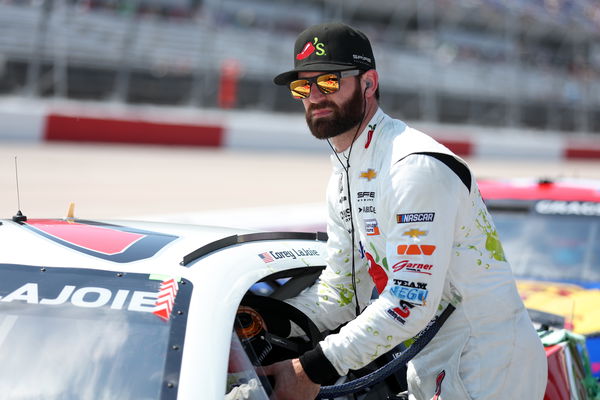
via Getty
DARLINGTON, SOUTH CAROLINA – AUGUST 31: Corey LaJoie, driver of the #7 Chili’s Catch-a-Rita Chevrolet, prepares to qualify for the NASCAR Cup Series Cook Out Southern 500 at Darlington Raceway on August 31, 2024 in Darlington, South Carolina. (Photo by Meg Oliphant/Getty Images)

via Getty
DARLINGTON, SOUTH CAROLINA – AUGUST 31: Corey LaJoie, driver of the #7 Chili’s Catch-a-Rita Chevrolet, prepares to qualify for the NASCAR Cup Series Cook Out Southern 500 at Darlington Raceway on August 31, 2024 in Darlington, South Carolina. (Photo by Meg Oliphant/Getty Images)
Rick Ware Racing has stirred up plenty of chatter about its future direction, particularly when it comes to the fate of driver Corey LaJoie. After a tough 2024 season, LaJoie’s unexpected departure from RWR has many wondering if the decision is rooted in more than just performance on the track. With shifts in team strategy and potential financial considerations, it’s clear that RWR’s long-term goals might steer them in a different direction.
The timing of LaJoie’s exit raises even more questions when you consider recent developments within the team, including a key business move that has left fans and insiders speculating about RWR’s true intentions. As the team adjusts its focus, a deeper look into its evolving strategy suggests that financial decisions, rather than racing results alone, could be at the heart of the changes. Could this move signal a new era for RWR, one that involves big-picture deals over driver loyalty? Here is the full story behind this intriguing decision.
ADVERTISEMENT
Article continues below this ad
Why Corey LaJoie does not have a seat for 2025
First off, let’s consider the money angle. RWR recently made a move that’s raised many eyebrows—they’ve leased out their charter to RFK Racing. This isn’t just a simple swap of cars; it’s a savvy business move. By leasing their charter, RWR still gets a cut of the charter agreement revenue, even though they’re not directly fielding the car themselves. It’s a great way to keep the cash flow coming in without the massive expense of running multiple full-time cars. The arrangement with RFK Racing allows RWR to continue benefiting from its existing infrastructure and assets while giving it flexibility for the future. If they don’t have to field cars themselves, why not make money from those resources? It makes a lot of sense.
But the financial implications don’t stop there. RWR is also one of Ford’s “experimental” teams, meaning they’ve been involved in some of Ford’s newer strategies and innovations. This could be another factor at play. Ford might be more inclined to funnel resources to support their higher-tier teams like Brad Keselowski’s RFK Racing, who is more likely to deliver results and help Ford get the recognition they want. By keeping a charter lease with RFK, RWR is aligning itself with Ford’s priorities, which could be a better long-term strategy than committing to a driver like Corey LaJoie, whose performances haven’t exactly been top-tier.
And there’s also the matter of the future. LaJoie has been vocal about having options both behind the wheel and off-track, and while he’s trying to remain optimistic, it’s clear that his future in NASCAR is uncertain. If the financial stability of RWR is tied more to charter deals and less to racing performance, it makes sense that they wouldn’t prioritize renewing a driver who hasn’t been able to crack into the top ranks of the Cup Series.

via Getty
INDIANAPOLIS, INDIANA – JULY 20: Corey LaJoie, driver of the #7 Gainbridge Chevrolet, looks on during qualifying for the NASCAR Cup Series Brickyard 400 at Indianapolis Motor Speedway on July 20, 2024 in Indianapolis, Indiana. (Photo by James Gilbert/Getty Images)
All things considered, it seems that RWR’s decision wasn’t just about LaJoie’s potential behind the wheel. It’s a calculated business move, a play to secure the best financial deal moving forward. By leasing out its charter and supporting other teams like RFK, RWR is likely aiming to position itself for greater financial stability—even if it means letting go of a driver who, despite his potential, couldn’t deliver the results necessary to keep him in the seat for 2025. The bottom line for RWR is money, and Corey LaJoie, unfortunately, seems to be a casualty of that reality.
What’s your perspective on:
Is Corey LaJoie a victim of RWR's financial strategy, or was his performance just not enough?
Have an interesting take?
RKF Racing is bringing in Ryan Preece for their leased charter
For 2025, RFK Racing is expanding to field three full-time cars, with Ryan Preece joining the team as the driver of the No. 60 car and Kroger stepping up as the primary sponsor. This marks a new chapter for Preece, who will make his sixth full-time Cup Series season as he takes away the charter that once belonged to Corey LaJoie. His addition to the team is part of RFK Racing’s growth, and they’re securing a major partner in Kroger, who has been in NASCAR since 2010, with nearly 20 brands backing their cars across all three drivers, including Preece, Chris Buescher, and team co-owner Brad Keselowski.

via Imago
LOUDON, NH – JULY 15: Ryan Preece 41 Stewart Haas Racing Mohawk Northeast Ford smiles for a photo before practice for the NASCAR, Motorsport, USA Cup Series Crayon 301 on July 15, 2023, at New Hampshire Motor Speedway in Loudon, NH. Photo by Erica Denhoff/Icon Sportswire AUTO: JUL 15 NASCAR Cup Series Crayon 301 EDITORIAL USE ONLY Icon23071529301
RFK Racing’s decision to bring Preece to board and secure a third car was made possible in part by leasing a charter from Rick Ware Racing for the No. 60 entry, adding another layer to their competitive edge. Kroger’s partnership with RFK Racing is expected to be a significant boost, especially with their established presence in the sport and continued collaboration with their other brands. This expansion is a strategic move by RFK, with Preece’s grassroots racing background and Kroger’s support setting the stage for a strong 2025 season. The No. 60 car is set to make some waves with this new lineup and sponsor backing, showing that RFK Racing is on the rise.
Do you think that Corey LaJoie will find himself on the Cup Series grid in 2025? Share your thoughts in the comments below.
ADVERTISEMENT
Article continues below this ad
ADVERTISEMENT
Article continues below this ad
Have something to say?
Let the world know your perspective.
ADVERTISEMENT
ADVERTISEMENT
ADVERTISEMENT
ADVERTISEMENT


Is Corey LaJoie a victim of RWR's financial strategy, or was his performance just not enough?